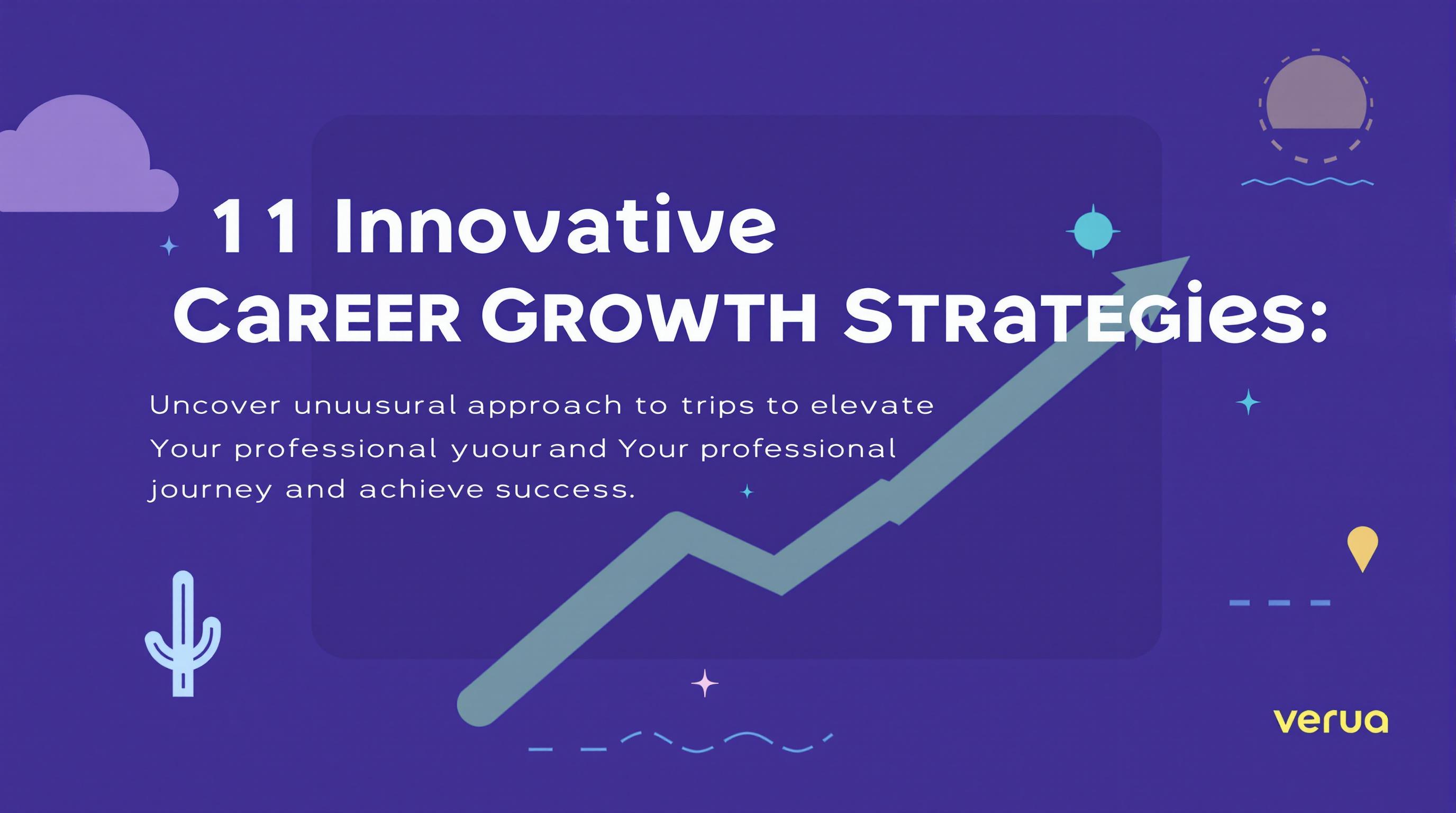Related Articles
- Navigating the Talent Labyrinth: How Emotional Intelligence Is Shaping New Hiring Practices in Unseen Markets
- Behind the Scenes: How Automating HR Processes Is Redefining the Future of Recruitment and Job-Seeking Strategies
- Beneath the Surface: Unveiling the Surprising Role of Environmental Sustainability in Shaping Future Careers
- Exploring the Quirky Side of Remote Work: How Hobbies Are Fueling Professional Success in Unexpected Ways
- How the Remote Revolution is Inspiring Unlikely Friendships Across Continents: A Study of Global Connectedness
- The Unforeseen Bond: How Virtual Coworking Spaces Foster Unexpected Connections Amidst Remote Work
11 Innovative Career Growth Strategies: Uncover Unusual Approaches to Elevate Your Professional Journey and Achieve Success
11 Innovative Career Growth Strategies: Uncover Unusual Approaches to Elevate Your Professional Journey and Achieve Success
11 Innovative Career Growth Strategies: Uncover Unusual Approaches to Elevate Your Professional Journey and Achieve Success
1. Embrace Lifelong Learning
In today’s fast-paced job market, the concept of lifelong learning has become essential for career growth. Engaging in continuous education can equip professionals with new skills and knowledge, making them adaptable in a constantly evolving workforce. Online platforms such as Coursera and LinkedIn Learning offer diverse courses tailored to various industries, allowing individuals to learn at their own pace.
Beyond formal education, seek out mentorship opportunities. Learning from someone with more experience can provide unique insights and practical advice. Mentorship fosters personal and professional development, creating a supportive relationship that encourages exploration and curiosity in your field.
Additionally, attending workshops and industry conferences can spark innovation and provide networking opportunities. These events not only enhance skills but also allow you to connect with like-minded professionals, igniting new ideas for career advancement.
2. Build a Personal Brand
In a competitive job market, establishing a personal brand can set you apart. A strong personal brand allows you to showcase your unique skills, experiences, and values. Utilize social media platforms such as LinkedIn to share insights, engage with industry trends, and connect with professionals within your field.
Developing a professional website or blog can also serve as a portfolio to demonstrate your expertise. By sharing articles, projects, or case studies, you can create a narrative around your career that reflects your accomplishments and aspirations, enticing employers to take notice.
Consider using public speaking opportunities or webinars to further enhance your visibility. Presenting at events not only builds credibility but also positions you as an industry thought leader, expanding your professional network and opening doors to new career opportunities.
3. Leverage Emotional Intelligence (EI)
Emotional intelligence—the ability to understand and manage your emotions, and those of others—plays a critical role in professional success. High EI can enhance communication, collaboration, and conflict resolution skills, making you a valuable asset to any team. Professionals with strong emotional intelligence often demonstrate better leadership abilities and adaptability in various work environments.
To cultivate EI, practice self-awareness through reflection and solicit feedback from peers or mentors. Understanding your emotional triggers, strengths, and weaknesses helps in developing more productive relationships at work. Additionally, learning active listening techniques can enhance your interactions and foster collaboration.
Employing emotional intelligence in the workplace can lead to a more positive company culture, which in turn promotes job satisfaction and retention. As you become more attuned to the dynamics of your workplace, you position yourself for leadership roles and growth opportunities.
4. Network Strategically
While networking is not a new concept, strategic networking can unveil uncharted opportunities for career advancement. Identify key individuals within your industry who can influence your career path and establish genuine relationships. Attend networking events, join professional organizations, or engage with alumni networks to maximize your reach.
Consider the power of informational interviews as a means to expand your network. These conversations can provide valuable insights into different roles or industries while building connections with experienced professionals. Approaching these meetings with curiosity rather than intent to secure a job can lead to more rewarding exchanges.
Finally, remember to maintain these relationships. Regular check-ins and follow-ups demonstrate your appreciation and keep you top-of-mind for potential opportunities. Networking is about building a community, and being an active participant can pay dividends in your professional journey.
5. Seek Cross-Functional Experience
Gaining cross-functional experience can provide a broader perspective of your organization and its operations. Working on projects outside of your direct expertise enhances your skill set while fostering collaboration between different departments. This diversification can open doors to leadership roles as it showcases your adaptability and versatility.
Volunteer for task forces or committees within your organization that require input from various functions. This approach not only demonstrates initiative but also allows you to develop relationships with colleagues from different parts of the organization, growing your professional network.
Additionally, consider job shadowing opportunities within your company. Observing colleagues in different roles provides valuable insights and may inspire you to explore new career paths you hadn’t considered before. Such experiences can illuminate potential pathways for advancement.
6. Cultivate a Growth Mindset
Adopting a growth mindset—believing that abilities and intelligence can be developed—can profoundly impact your career trajectory. Professionals with a growth mindset are more likely to embrace challenges and learn from failures, viewing setbacks as opportunities for growth rather than a reason to give up.
Encourage yourself to step out of your comfort zone and seek roles or projects that stretch your capabilities. Embracing discomfort can lead to significant personal and professional growth. Moreover, celebrating small wins and learning from failures can reinforce a growth mindset, allowing you to remain resilient in the face of adversity.
Incorporating regular self-reflection into your routine can also help you identify areas for growth. By assessing your performance and seeking feedback, you can uncover skills or knowledge areas to focus on moving forward, positioning yourself for greater career success.
7. Explore Remote Work Opportunities
The rise of remote work has transformed the employment landscape, offering unique opportunities for career growth. Remote employment can expose you to diverse industries and global teams, broadening your understanding of various work cultures and practices.
Working remotely allows for flexibility and adaptability, as you can often tailor your work environment to enhance productivity. This newfound autonomy can boost creative thinking and innovation, leading to enhanced performance in your role.
Additionally, remote work encourages the development of self-discipline and time management skills. Mastering these skills can contribute significantly to your professional growth, better preparing you for future opportunities both remotely and in traditional office settings.
8. Volunteer for Leadership Roles
Volunteering for leadership opportunities, whether in your workplace or in external organizations, can significantly enhance your professional profile. Taking charge of a project or leading a committee showcases your management skills and ability to drive results, elevating your candidacy for future leadership positions.
Leadership roles can also teach valuable skills, such as conflict resolution, strategic thinking, and team management. Embracing these challenges positions you as a proactive, engaged professional, which can appeal to potential employers.
Moreover, these experiences increase your visibility within your organization and industry, contributing to your overall networking strategy. By positioning yourself as a leader, you increase your chances of being considered for promotions and advanced opportunities.
9. Utilize Feedback Effectively
Feedback is a powerful tool for professional growth, yet many individuals struggle to engage with it constructively. Actively seeking feedback from peers, supervisors, and mentors can provide critical insights into your performance and areas for improvement. Embrace both positive and constructive feedback as key components of your career development.
Create a system for receiving and acting on feedback, which could include regular performance check-ins or informal requests for insight. Incorporate this feedback into your personal growth plan, focusing on areas that require development. This proactive approach will foster continuous improvement in your skills and performance.
Additionally, providing constructive feedback to others can further refine your communication and mentoring abilities. Not only does it help in sharpening your perspective, but it also positions you as a supportive colleague—and potential leader—in your professional circle.
10. Stay Authentic
Authenticity in the workplace fosters trust and connection, which can enhance your career growth. Rather than conforming to external expectations, embrace your unique strengths, values, and experiences. Being authentic not only boosts your confidence but also attracts opportunities that align with your passions and career goals.
Openly sharing your ideas and opinions encourages transparent communication and collaboration. Authentic leaders often promote better team dynamics and innovation, creating a positive influence in the workplace.
Moreover, authenticity resonates with employers who value employees that align with their company culture. Presenting your true self can provide a competitive edge and invite opportunities that feel fulfilling and purposeful, ultimately steering your professional journey toward success.
11. Focus on Work-Life Integration
Achieving a balance between professional and personal life is crucial for long-term career success. Rather than pursuing a strict separation of work and personal life, aim for work-life integration that optimally serves both aspects. Prioritizing well-being fosters creativity and productivity, ensuring you remain energized in your professional endeavors.
Create boundaries that allow for flexibility while maintaining accountability for your work. This may include scheduling breaks or designating phone-free times to rejuvenate your mind and spirit. Establishing these practices can enhance your overall job satisfaction and performance.
Additionally, championing a culture of work-life integration within your team can positively impact organizational morale. Engaging in wellness programs or encouraging time-off initiatives can reinforce workplace relationships and lead to a healthier work environment, propelling everyone toward success.




